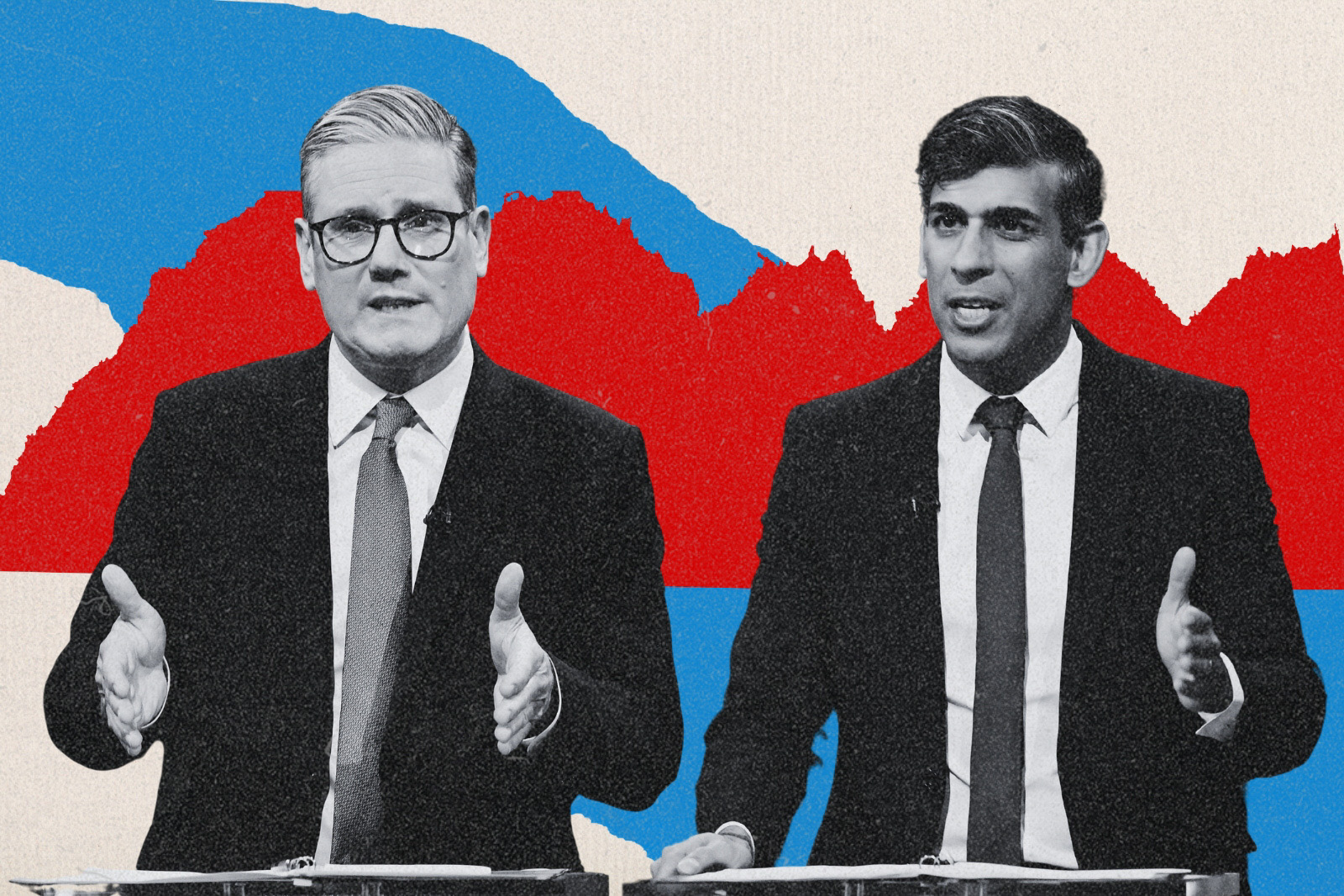Labour says the ‘£2,000 tax rise’ is nonsense. But when did that matter in politics?
Rishi Sunak’s attack line on Keir Starmer’s spending commitments could turn out to be the new ‘£350m for the NHS’
–

“Thank God for television debates,” was the conclusion from one member of the travelling press pack at the ITV debate on Tuesday night. Backstage in the spin room, there was at last an injection of excitement and energy — for the first time in what has been a rather dull election campaign.
Rishi Sunak and Keir Starmer went head to head with very different objectives. Sunak, whose party is consistently more than 20 points behind in the polls, needed to take risks. Starmer, who according to the polls may be on course for a record-breaking majority, needed to make sure he navigated the potential banana skin of a live televised grilling without causing any major damage to his campaign.
While the debate was fierce, it was the prime minister’s claim that Labour would raise every household’s taxes by £2,000 a year that has emerged as the biggest takeaway. Sunak mentioned it several times in the debate and Starmer seemed to ignore it repeatedly, only finally trying to knock it down in the second half of the event. When I spoke to health secretary Victoria Atkins immediately after the debate, she jumped on that delay, questioning why he had not hit back sooner if the figure was inaccurate. She even suggested that someone in Starmer’s team had nudged him in the break to respond, and that he may not have done so at all otherwise.
From a slow start, Labour HQ released a statement almost immediately after the debate reiterating its position that the figure was wrong. The party also claimed there were 11 errors in the assumptions that were made to make the calculations.
Now a letter has emerged from the Treasury’s chief civil servant James Bowler that was sent to Labour a couple of days ago refuting the prime minister’s claim that the £2,000 figure had come from “independent Treasury officials”. In a damning verdict Bowler says the assessment “should not be presented as having been produced by the civil service” and was, rather, based on assumptions made by Conservative special advisers.
I put this directly to Claire Coutinho, the business secretary, quoting the letter to her and asking whether the prime minister had been disingenuous. But the Conservatives have smelt blood. Coutinho doubled down, going so far as to say the £2,000 figure was a likely underestimate of the costs. Meanwhile, the prime minister has tweeted a new video based firmly on the £2,000 attack line, and the party is continuing to push a campaign poster that came out last week on the same subject. Far from backing down, the Tories are making the claim a key part of their race to hold onto power.
The strategy feels very similar to the infamous Brexit “£350m a week to the NHS” slogan. That, too, was disputed but became a huge part of the Leave campaign. It was a talking point, it stuck, and the public remembers it to this day. That is something the Conservatives are desperately hoping for with this new claim. They may be disastrously behind in the opinion polls, but if they can make the idea of tax rises under Labour stick, it could prove very helpful.
I suspect the Conservatives will be quite pleased with the impact it has had so far: most of the reaction this morning is focused on it, and several UK newspapers have put it on their front pages. When I interviewed former shadow cabinet member Jonathan Ashworth, he was far from impressed. He called Rishi Sunak a liar, giving detailed reasoning why he thought the figure was wrong, and saying over and over again that the PM had intentionally misled the public during the live debate. I’m guessing, though, that Tory advisers will be pointing to the Ronald Reagan quote of “if you’re explaining, you’re losing”, and feeling quite chuffed.
As the campaign goes on, I would not be surprised if we see Sunak repeatedly doubling down on this and similar attack lines. He’s a long way behind, and the only way to catch up is to change people’s perception of Labour.
Ultimately, though, this debate was an almost even affair. Two snap polls carried out afterwards – one by YouGov, which has Sunak edging it by 51% to 49%, and the other by Savanta, which puts Starmer in front by a healthier gap (44% to 39%) — indicate that last night is unlikely to shift the dial.
But if the £2,000 attack line sticks, then it is Sunak who has the most reason to be pleased with the outcome. And if the next set of opinion polls show that Labour’s lead has shrunk, even marginally — as leads often do in the run up to an election — then we should expect more of the same. Going on the offensive is all Sunak can do if he wants even a chance of pulling off a miracle and staying in Number 10.
Shehab Khan is an award-winning presenter and political correspondent for ITV News.
Topics
Get the Hyphen weekly
Subscribe to Hyphen’s weekly round-up for insightful reportage, commentary and the latest arts and lifestyle coverage, from across the UK and Europe
